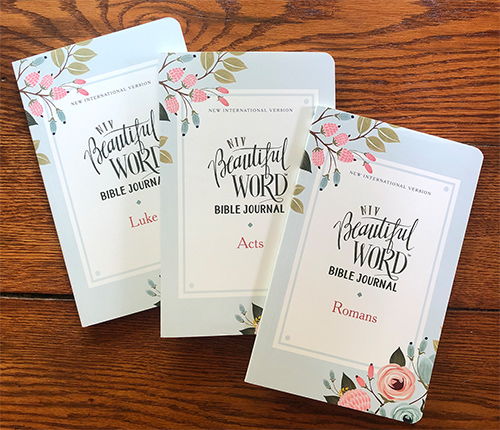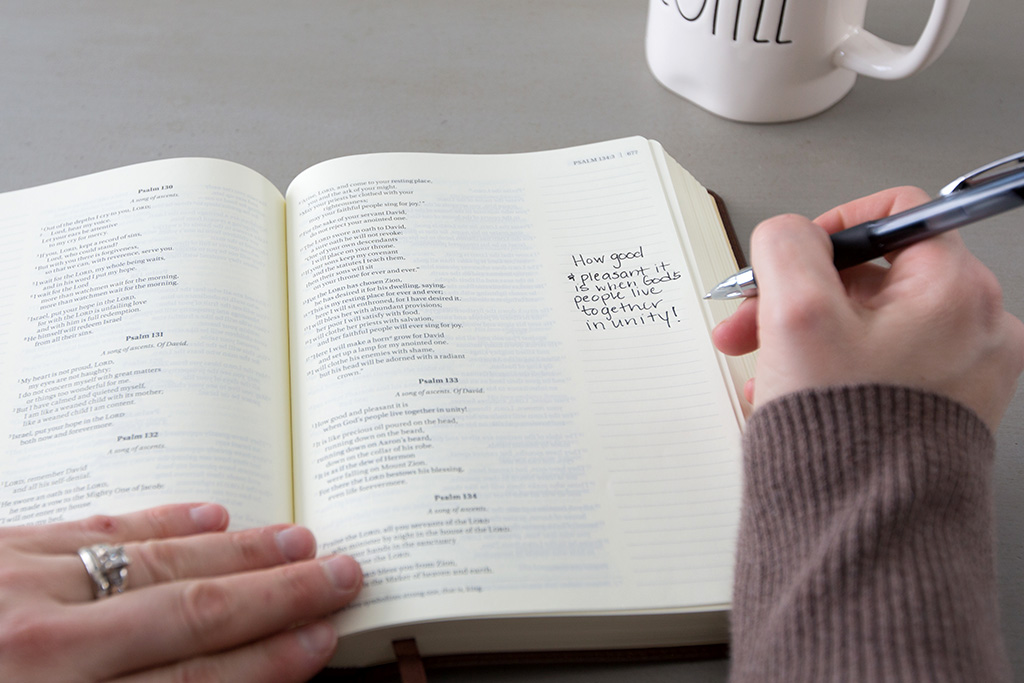
Three Bible Journaling Ideas for Your Spiritual Walk
How many people have begun journaling since the COVID-19 global pandemic swept the world?
Those of us who have begun the process of putting pen to paper—be it physical or virtual—during this time have discovered the many benefits of doing so. From recording family events, to organizing our thoughts on a certain subject, to reflecting on what is happening in the larger world, the process and practice of journaling can sharpen our thinking, boost our memory, improve our writing skills, and inspire creativity. Of course, there’s also the added benefit of allowing successive generations to learn from our experiences.
Journaling within the pages of Bible-related products brings the added benefit of having a divine guide and a focus for our thoughts. As we read the timeless words of Scripture and seek to apply the teachings to our own lives, we can keep sermon notes, write down our personal reflections, and even create artwork in response to a particular story or teaching. All of these activities deepen our interaction with the text and help us to grow spiritually.
Furthermore, as we consider leaving a legacy of writing for those we love, we can take inspiration from the words of the Psalmist, who wrote, “One generation commends your works to another; they tell of your mighty acts. They speak of the glorious splendor of your majesty—and I will meditate on your wonderful works. They tell of the power of your awesome works—and I will proclaim your great deeds” (Psalm 145:4-6).
So what are the best ways to maximize our experience with Bible journals? Let’s take a look at three key opportunities that we find with these special products.
1. Note Taking
Using Bible journals to take sermon notes or make personal comments on the text is a valuable way to engage with Scripture. Listening to teaching, studying other materials that bring light to the text, and discussing passages of Scripture in small-group formats brings new insight into the journaling habit. Think about these time-tested methods as you begin to write down your thoughts.
• Outlining. As you learn about the important structure of the original text, indicating the parts of that structure in the journal space will help bring about a greater understanding of how meaning is conveyed via the different literary genres in the Bible.
• Summarizing. Journaling about the details of longer passages and summarizing their contents will jog your memory as you reread beloved passages or encounter new excerpts. Included in this practice is writing down definitions of terms and describing teachings and characters you encounter in the text.
• Linking. Ideas, stories and individuals appear in different contexts both within and between Bible books. Linking these entities in your journaling allows you to see the intricate interconnectedness and harmony of Scripture.
• Question/Response. Consider writing “wondering” questions in the journal space so that you can consider them over time. If or when you find answers, take the time to write those down as well.
• Note Taking. This last category includes all of the previous methods. The main idea here is to be as inventive as you can as you record what you’re learning in church, in your small group, and within your personal study.
2. Personal Response
Taking the time to carefully examine your thoughts and personal responses to the stories and teachings of God’s Word is a worthy pursuit. As you read the text of Scripture and apply it to your life, think about the following ways to engage on a more heart level.
• Respond Through the Filter of Your Life circumstances. Considering this idea, we can take inspiration from God’s word to Jeremiah: “Before I formed you in the womb I knew you, before you were born I set you apart” (Jeremiah 1:5). God he knows us intimately and his purposes for our lives are good. That’s why the Word of God is living and active—while the words of Scripture stay the same, how we understand those words changes as our life situation changes. As you record your responses to your discoveries based on your life today, think about how these teachings have come to mean different things to you over time. And in months or years to come when you revisit what you’ve written, you’ll be able to do the same.
• Respond Through the Filter of Your Relationship with God. The Psalmist prays, “Cause me to understand the way of your precepts, that I may meditate on your wonderful deeds” (Psalm 119:127). You can do this as well as you explore how God is speaking to you through his revealed Word. As you write, speak directly to him with all of the praise and emotion and questions you can muster. And as you learn more through your personal study, go back to those statements and respond by recording your newest learnings.
• Respond Through the Filter of Others. Those we love are constantly on our minds. As you explore Scripture, take time to also explore ways in which you can pray for, inform and encourage others. Make notes in the journal pages that will remind you of people whose hearts could also be touched by God’s Word. And pray for those you love as you read and write. After all, “the prayer of a righteous person is powerful and effective” (James 1:5).
3. Creative Response
Bible journals also allow us to express ourselves creatively in response to the text. Personal expression can run the gamut from writing to creating artwork on the journal pages. And of course, it can include combinations of all of these ideas. Giving yourself freedom to respond to God’s Word in different creative ways can open up new perspectives as you activate different parts of the brain and open yourself to new avenues of understanding.
• Respond Through Reading Out Loud. Many people are surprised at what they discover when they read passages out loud. Hearing the Word of God is different from reading the word of God silently. Something different happens when, for example, the statements of the prophets, the psalms, or the words of Jesus are read out loud. After you read your favorite passages out loud, write down any new insight you have.
• Respond Through Writing. Creating poetry, writing down prayers, recording the lyrics of worship songs or hymns that relate to passages of Scripture, and exploring other creative writing outlets deepens your cognitive response to what you understand about God and his story.
• Respond Through Artwork. Let your imagination run wild as you draw or color in response to what you’re reading in the Bible text. Use color and shape to express what you’re feeling as you read and understand the implications of the text, whether it be for the first time or the hundredth.
***
The God who created the universe and every single person who has ever or will ever live; the God who sent his Son to earth to teach, to lead, to suffer and die, and to defeat death; the God who longs to be intricately and intimately involved in the lives of those he loves—that’s the God who invites us to respond to him.
When paired with a vital prayer life, God’s written Word provides us with the opportunity to interact with the God who made us, who has saved us, and who loves us. Finding both left-brained (linear/study/note taking) and right-brained (emotive and creative) ways to respond to God’s revealed work in our lives is the main benefit to using a Bible journal.
By Mike Vander Klipp, a senior editor with the Zondervan Bible Group, where he’s been privileged to work for the past three decades. He and his family live in Grand Rapids, Michigan. He has been journaling every day for over 30 years.
If you are looking for more helpful information on Bible journaling, here are several other articles on the NIV blog on this subject –
Charting Your Spiritual Growth through Bible Journaling
How to Choose the Best Bible Journaling Tools
How to Bible Journal
Consider These NIV Bible Journals:

The Jesus Bible Journals, NIV
From the Passion Movement, The Jesus Bible Journals, NIV, lift Jesus up as the lead story of the Bible. Journals include study features and articles from The Jesus Bible with generous lined journaling space on every other page.
Learn More
NIV Beautiful Word Bible Journals
NIV Beautiful Word Bible Journals include verse art and wide margins for journaling. As fans of Beautiful Word have come to expect, the colorful, illustrated art and uplifting imagery encourage a deep quiet time.
Learn More
NIV Adventure Bible Field Notes
NIV Adventure Bible Field Notes are the perfect introduction to Bible journaling for kids! Featuring interactive prompts from the bestselling NIV Adventure Bible, the NIV Adventure Bible Field Notes help kids encounter Scripture in a new way!
Learn More





